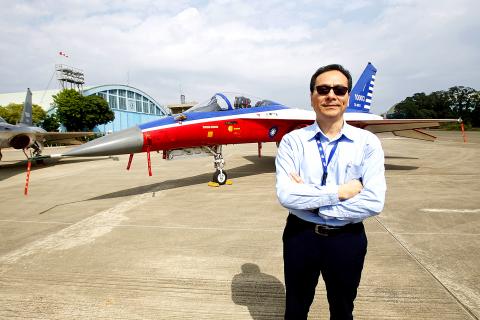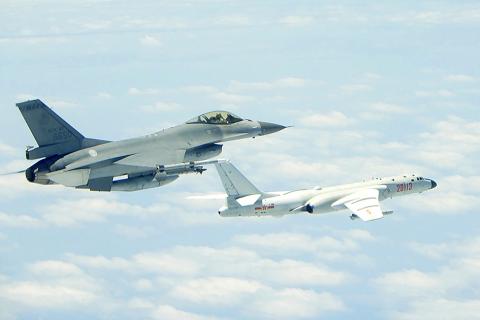Standing on his company’s sprawling campus in central Taiwan, Lin Nan-juh (林南助) said he is able to make any plane his government calls for.
“We can do whatever’s asked,” said Lin, president of Aerospace Industrial Development Corp (AIDC), a leader in the defense industry serving Taiwan.
It is a bold statement with potentially major significance for Taiwan’s democratic survival as it seeks to build up its domestic defense industry in the face of China’s warnings and the reluctance of foreign arms suppliers to provide it with the planes, ships, submarines and other hardware it needs to defend its 23 million people.

Photo: AP / Ministry of National Defense
While the US — which is legally bound to respond to threats to Taiwan — continues to be its main arms supplier, Taiwan is increasingly looking to replace those politically fraught, touch-and-go deals with domestic production that is reliable as well as technologically advanced.
Taiwan’s indigenous systems are “both a source of national pride and a product of necessity,” said David An, senior research fellow with the Washington-based policy incubator Global Taiwan Institute. “As it’s commonly said, necessity is the mother of invention.”
The self-reliance policy has been strongly promoted by President Tsai Ing-wen (蔡英文), whose government has been shunned by Beijing since shortly after she took office more than two years ago.

Photo: AP / Ministry of National Defense
Defense is included in Tsai’s economic program targeting eight industries for innovation and job creation, with the government helping match its defense needs with the abilities of Taiwanese companies.
China’s recent actions have underscored the risk for Taiwan.
Beijing has been upping pressure by cutting its already tenuous diplomatic links [with Taipei] and has sent military planes and an aircraft carrier close to Taiwan multiple times.
China has the world’s second-largest defense budget behind the US, significantly boosting its ability to blockade, attack and possibly invade Taiwan.
Taiwan’s domestic arms industry got started in the 1970s, more than two decades after Chiang Kai-shek’s (蔣介石) Nationalist forces fled China for the former Japanese colony after Mao Zedong’s (毛澤東) Chinese Communist Party seized power in 1949.
Adaption and development of foreign technology gave companies such as AIDC much of what they needed to grow and help keep the peace with the mainland, said Mei Fu-shing, (梅復興) director of the Taiwan Security Analysis Center, a research and consulting practice based in New York.
“Indigenously developed and produced weapons have contributed materially to deterrence in the Taiwan Strait over the past three or four decades,” Mei said.
Taiwan’s capabilities have improved of late in both quality and technical sophistication, Mei said, pointing to the production of air-to-air missiles as an example.
“Taiwan’s defense industry obviously has progressed,” making it less reliant on foreign sources, he said.
Along with protest actions from Beijing — including the suspension of exchanges with the US military after a US$6.4 billion arms package for Taiwan was announced in 2010 — US sales are constrained by concerns about the leaking of sensitive advanced technology across the Taiwan Strait to China.
Despite that, such sales continue, with US President Donald Trump’s administration notifying the US Congress last year of its intent to approve seven proposed deals for technical support, anti-radiation missiles, torpedoes and other technology valued at about US$1.42 billion.
The Trump administration last month agreed to allow US firms with the technology to build much-needed diesel-electric submarines.
Taiwan’s navy operates just two aging subs bought from the Netherlands in the 1980s.
Analysts say sales of technology are less likely to prompt a strong response from China than those of complete systems such as planes or submarines.
Along with fighter jets and other aircraft, Taiwanese contractors already make anti-ship, surface-to-air and air-to-air missiles, as well as missile boats and Clouded Leopard armored vehicles.
Taiwan has long been known worldwide for its civilian high-tech industry and about 200 small and mid-sized companies work in defense.
AIDC and the National Chung-shan Institute of Science and Technology are among the larger contractors.
The aerospace firm reported sales income of US$235 million and a net profit in the third quarter of last year, the most recent made public online.
More than 3,000 people work on new aircraft designs at AIDC’s tree-lined campus, complete with a restaurant and a swimming pool. One of its planes marks a front entrance.
Despite the advances, Taiwan will never be able to quit buying advanced weapons from other countries, Ministry of National Defense spokesman Major General Chen Chung-chi (陳中吉) said.
Propulsion systems and engines for ships and aircraft are a particular need, and Taiwan sometimes finds that imports cost less than local production.
Yet such sales carry the risk of being used as bargaining chips to gain concessions from Beijing, particularly on trade.
Ultimately, officials in Washington might help Taiwan’s military again only if they see its capability decline, said Alexander Huang (黃介正), an associate professor of strategic studies at Tamkang University.
“Taiwan worries that there might be a time that we can’t buy the weapon system that we want, so we better build up our indigenous defense industry capability,” Huang said.

ENTERTAINERS IN CHINA: Taiwanese generally back the government being firm on infiltration and ‘united front’ work,’ the Asia-Pacific Elite Interchange Association said Most people support the government probing Taiwanese entertainers for allegedly “amplifying” the Chinese Communist Party’s propaganda, a survey conducted by the Asia-Pacific Elite Interchange Association showed on Friday. Public support stood at 56.4 percent for action by the Mainland Affairs Council and the Ministry of Culture to enhance scrutiny on Taiwanese performers and artists who have developed careers in China while allegedly adhering to the narrative of Beijing’s propaganda that denigrates or harms Taiwanese sovereignty, the poll showed. Thirty-three percent did not support the action, it showed. The poll showed that 51.5 percent of respondents supported the government’s investigation into Taiwanese who have

South Korean K-pop girl group Blackpink are to make Kaohsiung the first stop on their Asia tour when they perform at Kaohsiung National Stadium on Oct. 18 and 19, the event organizer said yesterday. The upcoming performances will also make Blackpink the first girl group ever to perform twice at the stadium. It will be the group’s third visit to Taiwan to stage a concert. The last time Blackpink held a concert in the city was in March 2023. Their first concert in Taiwan was on March 3, 2019, at NTSU Arena (Linkou Arena). The group’s 2022-2023 “Born Pink” tour set a

A Philippine official has denied allegations of mistreatment of crew members during Philippine authorities’ boarding of a Taiwanese fishing vessel on Monday. Philippine Bureau of Fisheries and Aquatic Resources (BFAR) spokesman Nazario Briguera on Friday said that BFAR law enforcement officers “observed the proper boarding protocols” when they boarded the Taiwanese vessel Sheng Yu Feng (昇漁豐號) and towed it to Basco Port in the Philippines. Briguera’s comments came a day after the Taiwanese captain of the Sheng Yu Feng, Chen Tsung-tun (陳宗頓), held a news conference in Pingtung County and accused the Philippine authorities of mistreatment during the boarding of

88.2 PERCENT INCREASE: The variants driving the current outbreak are not causing more severe symptoms, but are ‘more contagious’ than previous variants, an expert said Number of COVID-19 cases in the nation is surging, with the Centers for Disease Control (CDC) describing the ongoing wave of infections as “rapid and intense,” and projecting that the outbreak would continue through the end of July. A total of 19,097 outpatient and emergency visits related to COVID-19 were reported from May 11 to Saturday last week, an 88.2 percent increase from the previous week’s 10,149 visits, CDC data showed. The nearly 90 percent surge in case numbers also marks the sixth consecutive weekly increase, although the total remains below the 23,778 recorded during the same period last year,